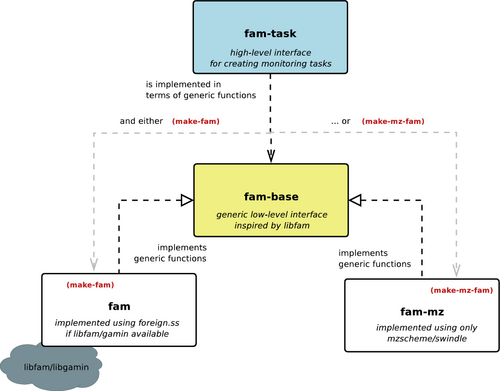Introduction
MzFAM consists of a set of PLT-scheme modules providing utilities to
monitor and react to filesystem changes. It exports a high-level
interface consisting of monitoring tasks that run as independent
threads and invoke callback procedures each time a file alteration is
detected. These high-level tasks (provided by the module
fam-task) are implemented using either Linux's
FAM/Gamin
monitors or, in systems (like Windows) where it is not available, a
pure Scheme fall-back implementation. This low-level functionality is
in turn provided by two modules (fam and fam-mz,
respectively) that share the generic interface defined by a third one,
fam-base. You may use fam or fam-mz directly
(bypassing the high-level interface) if you find fam-task not
suitable for your needs. The generic functions in fam-base are,
basically, one-to-one counterparts of those provided by the
libfam C library1.

Using FAM tasks is quite straightforward. So, the impatient among you
may prefer to take a look at the procedures exported by
fam-task.ss (and perhaps the sample scripts in the aptly
named examples subdirectory) and skip the rest of this
manual. For those of you still here, chapter 2 is a
tutorial on FAM tasks, and should provide all the information
needed to use MzFAM in your programs. In
chapter 3, you'll find reference sections
(written using the dry, legalistic tone we all know and love) with all
the details of the exported fam-task interface.
In case you need more fine-grained control over your file-monitoring,
turn to chapter 4, which describes the
generic interface exported by the fam-base module and
implemented by fam (using libfam (or
libgamin)) and by fam-mz (using Scheme).
1.1 Getting MzFAM
The latest MzFAM stable release is available on PLaneT, where you can also browse the source code and documentation. As with any other PLaneT-enabled package, using a require line like this one
(require (planet "fam-task.ss" ("jao" "mzfam.plt" 1 0)))
anywhere in your program will trigger the network magic necessary to get MzFAM installed in your system.
If you feel like living on the bleeding edge, the development tree (which includes build scripts and the documentation sources) can also be browsed online, and you can get it using darcs:
darcs get http://hacks-galore.org/jao/darcs/mzfam
Needless to say, you're not only welcome, but actually encouraged to send the author bug reports, improvement suggestions, constructive criticism or any kind of undeserved praise.
1 See also this tutorial on the FAM C library for further, unneeded details.